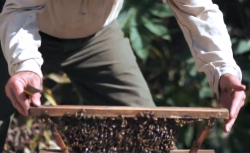San Diego City Council is expected to vote on changes early next year to its ordinances that regulate farming within city limits.
The proposed changes would relax regulations on farmers’ markets, retail farms, backyard chickens, miniature goats and honeybees. Currently, space restrictions mean few households within city limits can keep farm animals.
For example, beehives must be kept 200 feet away from any residency. That means Angela Webber’s hive, situated in a large backyard that extends into a canyon, is illegal.
“Even someone like me with this huge yard, I’m pretty sure my bees still are not legal,” Webber said.
The bees Webber tends to in her backyard could be legalized if the new regulations are passed. The Planning Commission recommends changing the ordinance so bees can be kept 30 feet from a home.
Urban agriculture advocates say the proposed changes would improve San Diego’s local food system by providing affordable, organic food for the poor and helping the community reconnect with where their food comes from.
Many in the movement have united behind the banner of the 1 in 10 Coalition, which aims to get one out of every 10 San Diego households to grow or buy food locally.
Webber said she reconnected with the food she eats by converting her large backyard into a small farm. She built raised garden beds for growing crops, a coop to collect her chicken’s eggs and a beehive for raw honey.
|
“There’s a connection with wildlife that we are truly lacking,” said Paul Maschka, an urban agriculture educator for San Diego City College. “It’s an eye opening experience when you look in a hive and see the steps it takes for thousands of bees to make a teaspoon of honey.”
Transcript:
Angela Webber, backyard beekeeper: People are usually really surprised to find out that I keep bees. When I first got them, I was trying to keep it a big secret. And then we told one of our neighbors… pretty soon people all the way up the street were saying “Oh ya, hey!” yelling at me from across the street, “How are your bees doing?” And I’m like “Ah! Don’t yell that!” I was kind of freaking out that everyone knew, but everyone seemed excited about it. No one has expressed any concern.
Paul Maschka, urban agriculture educator: There’s a number of people that do beekeeping and keep it hidden and keep it quiet and they’re being as responsible as they can, so it doesn’t become a nuisance. The codes, they’re being revisited. Most lots in the city are not that big.
Webber: Even someone like me with this huge yard. I’m pretty sure my bees still are not legal. No one would even know though, if I hadn’t told anyone that I had them. I feel like bees are just in your yard whether you like it or not. They’re going to be there in your flowers, you can’t stop them, no one is in control of that and other cities, like New York and Seattle, have recently changed their ordinance so that it’s 25 feet. I feel that’s a good number for urban beekeeping.
Maschka: I really like the idea of the craft of beekeeping and keeping them in the urban environment. There definitely is a connection with wildlife that we’re truly lacking.
Webber: People have forgotten what it’s like to make your own food and have to get your own food and kind of fend for yourself. You just go into the store and buy a packaged something or other and you don’t even know where it came from.
Maschka: It’s a real eye opening experience when you look in a hive, then you learn all the steps it takes for these thousands of bees to make a teaspoon of honey. That connection with that and understanding the services that any pollinators do for our food and without pollinators we definitely would not have food to eat.
Webber: I didn’t really think much about where my food came from or eating locally or the importance of any of that. When I was just thinking about getting into beekeeping, it seemed like this impossible thing. It’s just a connection with that knowledge of how to do it yourself again. Once you have that connection with where your food comes from you start thinking about what goes into your food and you start to see the whole cycle of life and you’re part of it.
Maschka: There truly is an awakening of people and their connection with food. Bees are just one piece of it, along with chickens and ducks and goats and all the different types of foods we can do in an urban setting.
Webber: I’m waiting for my neighbors to get chickens. I feel like they see my chickens and I’m hoping they’ll get jealous and get their own. I wish that they would have a vegetable garden and get chickens and make that connection.

